Listen to the Podcast Here:
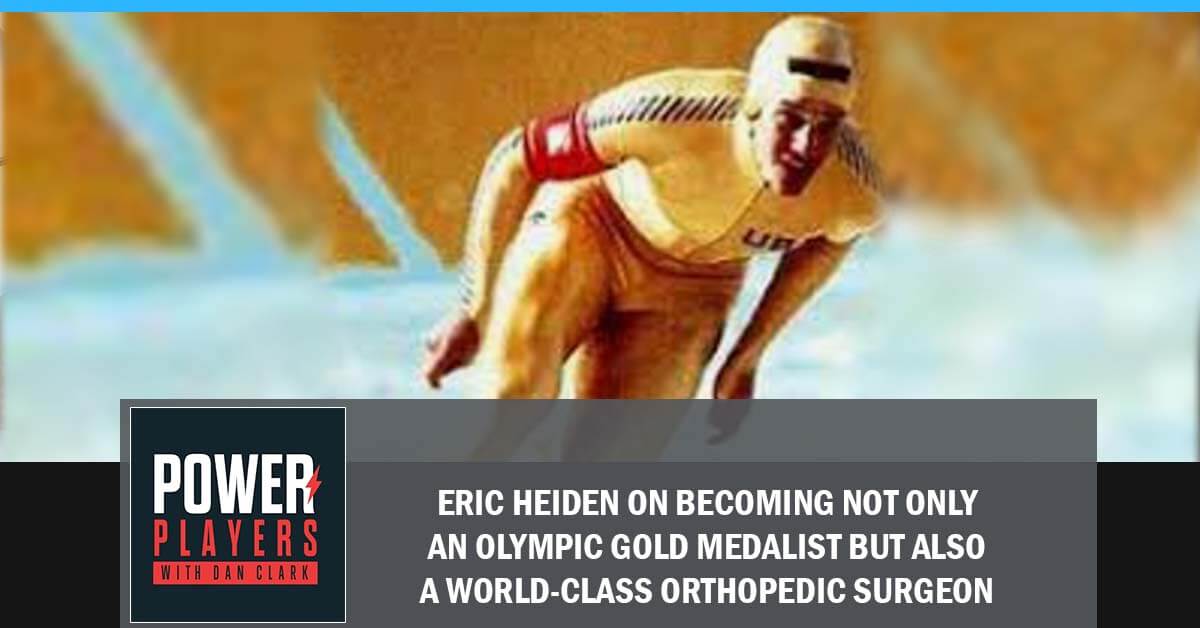
Being a champion in your field is a feat to be proud of – but the most successful people don’t settle for that. In this episode, five world record-holder and five-time speed skating U.S. Olympic gold medalist Eric Heiden talks to Dan Clark about his life and rise to the top of his sport. Eric joins us today to give us an inside glimpse of how his discipline, focus, desire, and practice regimen made him a world champion skater and bike racer. These values served as his foundation to excel in a different field and become a world-class orthopedic surgeon. Learn more as Eric gives away his secret on how you can have a passion for excellence in everything you do.
—
Eric Heiden On Becoming Not Only An Olympic Gold Medalist But Also A World-Class Orthopedic Surgeon
This is an interview with the Olympic gold medalist speed skater, Eric Heiden. Thanks for spending some time with me. In this episode, Eric Heiden, who set 5 world records and won 5 US Olympic gold medals in speed skating, shares his life and rises to the top of his sport. He will give us an inside glimpse of how his discipline, focus, desire, and practice regimen, not only made him a world champion skater and bike racer but it was the foundation for him to become a world-class orthopedic surgeon. On a personal note, he was a major influence in my recovery from my fourteen months of a paralyzing injury that cuts my football career.
—
Welcome to my show, Eric. Thank you so much for joining us.
You are welcome, Dan.
I was paralyzed playing football, and as I started to get better, I was asked to speak. Between 1983 and 1989, I was the guy that took Mrs. Reagan’s Just Say No program to all 50 states, so I became a motivational speaker. My flagship story was about Eric Heiden. You and I have never shaken hands. We have never met belly to belly but I know more about you than anyone you will ever know. I tear up in all reality having you.
This is so goofy having you on my show because, in 1980, I was still battling back from my paralysis. Your story inspired me. Let’s get right to the interview. There are three Ps I talked about in the introduction, Passion, Prepare and Pursuit. I have waited decades to ask you how you found your passion, not just for speed skating or long track skating but your passion for excellence in everything you do. It sounds like you have been a power player since DNA.
Preparation is fundamental to success. You have to prepare for a plan and walk through the next steps.
When you look at successful people, there is a passion that results in them having a drive beyond what the average person has. There were a couple of different things that I was and am still passionate about, which is one of the reasons why I pursued pretty unique things, to be a top speed skater, cyclist, and also to get into medicine. Passion as an athlete, I wanted to know what my physical limits were.
I was not so concerned about the results, how it compared to everybody else but in speed skating, you race the clock, so you know how fast you are going. I was passionate about knowing how fast I could be as a speed skater. Cycling was the same thing. I was passionate about figuring out what my physical abilities are, and it’s the same thing with medicine. I’m passionate about it because I want to take that I can become the best doctor, and that’s a challenge every day.
Another interesting fact is that your sister, Beth, is also a power player. She won a bronze medal in speed skating and was the Women’s World Road Race Cycling Champion also in 1980. There has got to be something going on in the Heiden household. Teach us from a parenting or individual perspective. How do we help our children and ourselves, first and foremost, identify that passion and keep fuel on the fire? You’ve got something unique to teach us from growing up in your home.
My sister was a good athlete. You think about the sports that the two of us got into and got good at are endurance sports. We had the DNA to be physiologically good endurance athletes but then you’ve got to have a great environment. We were lucky to have grown up in an environment where athletics was an important part of family outings. My grandfather was a coach at the University of Wisconsin in hockey. He lived on a lake, so there was always a pond that was cleared off that we could skate on. Our parents were good. They were very supportive of getting us to practices. They were very willing to step back and not become the bleacher parents who go off on coaches and referees.
They were good about standing back and letting the coaches coach, and referees referee. They exposed us to a lot of different activities so that we could find what we enjoy doing. I grew up playing soccer. I played tennis. I ran cross country in high school. I did a little bit of wrestling. I was a swimmer. I was a diver. I have tried all kinds of stuff. We had a chance to identify what we enjoyed, and it was not always something that our parents endorsed but because we showed an interest in it. They were willing to help us out and made sure that we were able to get to practices. It is a little bit of DNA and a good environment.

Olympic Gold Medalist: It comes down to that debriefing after a failure, knowing that you got the opportunity again to perform, and realizing it’s not the end of the world.
I have four children. We try to raise our children all the same, and then they turn out all different. You did all these outdoor sports. I have been to Madison, Wisconsin. I walked out of my hotel room, took a deep breath, and my nostril stuck together. You had this passion that drove you inside and outside, rain or shine, when a lot of people would say, “It’s a bad day. I don’t feel like training.” You relentlessly went into your indoor facility and kept pursuing this passion.
Let’s get to the second P, which is Preparation. Who inspired you to prepare outside of your home, and what did you specifically do mentally and emotionally to prepare yourself for the times you would slip, crash and burn into the wall or the times that your time was not what you thought it was supposed to be? How did you prepare yourself, and what did you specifically do outside of your home?
Preparation is fundamental to success. You have to prepare for plans A, B and sometimes plan C and run through. For me, it was rehearsal. Walkthrough the steps. If this happens, this is the next thing that I’m going to prepare to do, and here is the thing I’m going to prepare to do if this plan B doesn’t work. I have taken that philosophy. What I do with medicine within orthopedics is a little different, which makes it a challenge. You have to have plan A, which is what the book said. You’ve got to have plan B because sometimes plan A doesn’t work, and sometimes you have to have plan C. Preparedness and preparation have been a fundamental part of my success.
That brings up the backside of this preparation and the times that you set the Olympic records and broke the world records. Talk about when you failed and what did you do. How did you deal with failure mentally, emotionally and physically? How did you get back up and keep going at such a high level?
There are a lot of ways that you battle a lack of success. You’ve got to have a coach that you believe in. I had a lot of confidence in my coach. She knew how to pull all the right switches when I was down. For me, it was a self-evaluation and debriefing, “What happened? Why didn’t I perform as well as I did?” I did some very introspective soul searching. It allowed me to then make a plan on that and address what needed to get fixed.
If you fail, you’ll still have the ability to know what your limits are, and that’s how you live your life.
I’m a very good analytical person, and it comes down to that debriefing after a failure, knowing that you’ve got the opportunity again to perform. It’s not the end of the world. I always felt very confident that if I put in the preparation, work, and trained hard, I would be able to have the ability to know what my limits were, which I enjoy doing.
Give us an inside tour of a typical training day. I know I keep bringing it up but let’s specifically dive into how you train mentally. How do you train in the classroom before you hit the ice? How do you train physically? We have readers who want to be power players who understand the grind, gruel and discipline. It’s so crazy. I know you know it now sitting in the stands, watching sporting events.
Many people off the cuff say, “I would give anything to be Eric Heiden. I would give anything to have a gold medal. I would give anything to have been an orthopedic surgeon.” I want to turn around and say, “You would not or you would have already done it.” Teach us this incredible difference in your mindset, self-discipline, passion and preparation.
You’ve got to work hard. There is no way around not being a hard worker and successful at it as being a cyclist or a speed skater. You have to learn how to dig deep those sports. Every day when you practice, whether it’s dryland training or out on the ice, it’s important that you test your abilities to push what you sense are your physical limits, at least once during the workout. Start the workouts where you push your physical limits. There were days when we would do what we call hill tempos, where we would run up ski hills around the Madison area that were anywhere from about 2 to 5 minutes long. You are doing an all-out run as hard as you can.
Those were hard workouts. You have to repeat those things a number of times because that’s what speed skating is all about. It’s the guy who was willing to suffer the most. It’s not just during that one race but throughout the season with the training, and it’s going to be the best guy. You’ve got to practice that every day. The question is, how do you get psyched up to push yourself to that limit every day? That was always a challenge, even with the racing because you’ve got to push yourself to the limit every day.
You are racing the clock, and after your race, there are going to be some other guys who are going to know how fast they have to go because you have already raced. You are pushing it to the limit. Psychologically, it’s a tough sport. Cycling is the same thing. You are doing a lot of time trials. You have to mentally prepare yourself to push yourself to the limit every time you race. Sometimes, it’s having a lot of discussions between your brain and legs about what is going on. The stuff you see in the Olympics is the tip of the spear. There are a lot of other people who didn’t have that same mental focus, physical ability, and willingness to train hard. They never make it to that tip.
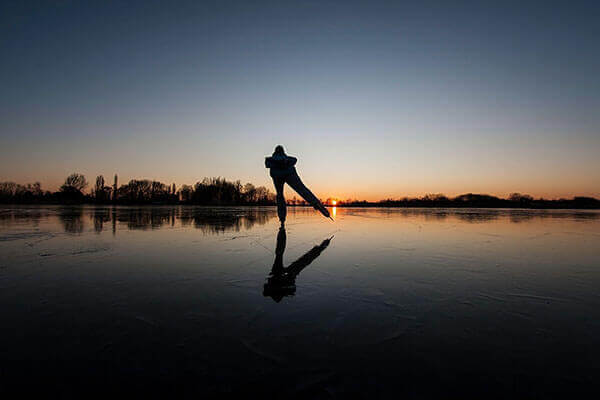
Olympic Gold Medalist: In sports, you have to learn how to dig deep. Every day when you practice, it’s important that you test your abilities to really push what you sense are your physical limits.
We become the average of the five people we associate with the most. If you hang around with five broke people, you are going to become the sixth. “You hang around with five whinings, blaming, and complaining people, you are going to become the sixth.” The epitome of that quote is we must be willing to pay any price and travel any distance to associate with extraordinary human beings. Teach us about your proactive choice in choosing friends and associates because I know everybody would want to be around you. You are this handsome stud muffin hunka burning love.
Everybody wants a slice of their kind. Everybody wants to be around you. How do you sit through the wannabes and attract the champions in your life? Surely, you didn’t always train by yourself. Didn’t you have a community? Somebody that could push you when you were not as motivated and somebody that you could push when they were not as motivated or was it individual training with your amazing coach?
To be successful, it takes a community. To be successful at anything, you want to surround yourself with good and smart people. Looking back at people that I considered influential in what I was doing was my sister. We lived in the same house. There are times you don’t want to get out of bed. You hear the screen door closed and right away on her bicycle like, “I better get out of bed. I can’t blow this work out off.” You’ve got your community of the people that you train with. Growing up in Madison, the Speedskating Club was a pretty strong club. We had some good skaters who were dedicated to training. That’s your community.
They push you because they are all very good athletes. Everybody would push each other pretty much every day. You felt a sense of wanting and needing to be there to support the community. You want to make sure that you surround yourself with good people and people that challenge you every day of your life and everything you are part of.
As we wind down to the third and last piece, let’s talk about the pursuit of your passion. One of the reasons why I have watched and admired you for so long is because you epitomized what it means to be a power player. We have all read Covey’s Begin With the End in Mind. My mind creates a limiting belief because it’s all about a destination.
You must be willing to pay any price and travel any distance to associate with extraordinary human beings.
Once you achieve that destination, people pat themselves on the back and say, “I did it. I’m going to lose 22 pounds.” They gained 30 pounds back, celebrating they lost 22 pounds. It would have been easy for you to say, “I’m world champion. I’m the greatest Olympian in winter sports history. I don’t have to do anything else. I can kick back and live off of my laurels.”
You decide that you are going to be a cyclist, and then you are like, “Let’s go to medical school.” The third P is how do you remain motivated to keep pursuing your passion? What I have learned from some of the other A-list interviews is that speed skating, cycling, and medical school only became a vehicle for you to pursue this amazing relentless pursuit of personal excellence. Teach us about how you continually become, maintain, and sustain yourself as a power player. It’s unbelievable.
One of the things that I try to live by is that carpe diem thing, “Seize the day.” Try to pursue excellence in the things that you do. It drives some of the people I hang out with crazy. I have a hard time accepting second best. I have this passionate pursuit of finding out what my limitations are. I want to know how good of a doctor can I be. I’m going to study hard because I want to try to be the best that I can be. I might not be as good as some guys but I’m going to know that this is my limit because I have challenged myself as best I can.
It’s the same thing with cycling and skating. I wanted to identify what my limits were. If you talk with the elite guys and talk about the pursuit of excellence, if you ask them, “Have you ever had a perfect race?” The guys who are successful or passionate about finding out will tell you they have never had a perfect shot playing golf or basketball. Michael Jordan would probably tell you he never played the perfect game. We would like to emulate and look at it as these power players that you talked about.
Let’s wind down. I have asked every one of my guests the key hot seat question. I have heard of Professor Randy Pausch. He was the one that coined the speech titled, Last Lecture. Here is the question, Eric. If you were going to take this raw, talented young man or woman, how would you train him or her up to be that superstar champion, the best version of themselves? In that process, it is more of that into whatever your last message to the world that we can all hold onto to become a power player.

Olympic Gold Medalist: You have to mentally prepare yourself to push yourself to the limit every time you race.
Be humble with your accomplishments. In the end, the most important thing is, “Did you leave a mark in this world and make this place a better place?” That would be my final words to say to people. You do that, and you’ve got a good chance of being a good person.
You have millions of fans, and you have remained humble. I appreciate you so much. I don’t apologize for getting emotional at the beginning. I didn’t know that was going to happen. You have impacted the lives of so many who don’t even understand speed skating. It’s because of your character and this passionate preparation and pursuit of excellence in all that you do that inspires all of us. I’m sure every reader on this show would give anything to shake your hand and look you in the eye and say, “Thank you for your inspiration.”
You make America so proud, and to see what you have done since the Olympics put you in a class by yourself as so many live off of their past laurels and reached a plateau and said, “That’s enough. I need a nap.” You roll out of bed every day and inspire. Thank you so much. Is there a way that we could support you in anything, any causes that you want us to know about, anything that you feel we could help you in your family or whatever we could do?
We have a foundation called Play Well Play Safe, which is a foundation whose goal is to teach kids how to participate in sports in a safe way, in a way that there is going to be something that becomes a passion for life.
Ladies and gentlemen, my guest has been the amazing Olympic cycling champion, world champion, American hero, Eric Heiden. Remember, when you finally decide to be a power player, your power play begins in you. Until next time. As Eric Heiden so eloquently reminded us, quantify your takeaway and go make a power play. Thanks, Eric. Have a good one.
Important Links:
About Eric Heiden
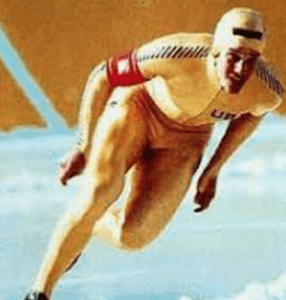 Eric Heiden is an American physician and a former long-track speed skater, road cyclist and track cyclist. He won an unprecedented five individual gold medals, and set four Olympic records and one world record at the 1980 Winter Olympic Games.
Eric Heiden is an American physician and a former long-track speed skater, road cyclist and track cyclist. He won an unprecedented five individual gold medals, and set four Olympic records and one world record at the 1980 Winter Olympic Games.
Heiden was the most successful athlete at those Olympic Games, single-handedly winning more gold medals than all nations except for the Soviet Union (10) and East Germany (9). He is the most successful Winter Olympian from a single edition of any Winter Olympics. He delivered the Athlete’s Oath at those same 1980 Games. His coach was Dianne Holum.
Heiden is an icon in the speed skating community. His victories are significant, as few speed skaters (and athletes in general) have won competitions in both sprint and long-distance events. Heiden is the only athlete in the history of speed skating to have won all five events in a single Olympic tournament and the only one to have won a gold medal in all events. He is considered by some to be the best overall speed skater (short and long distances) in the sport’s history. Heiden ranked No. 46 in ESPN’s SportsCentury 50 Greatest Athletes of the 20th Century in 1999, the only speed skater to make the list. In 2000, a Dutch newspaper called him the greatest skater ever.
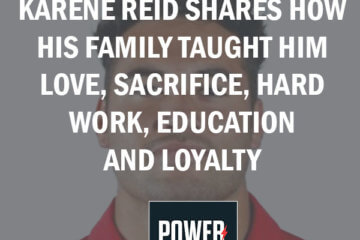

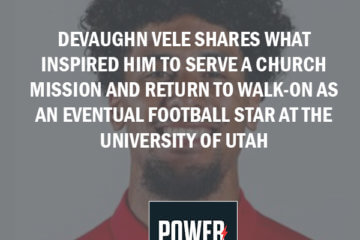
0 Comments